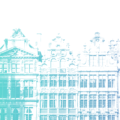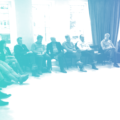- Multi-Solutions systémiques aux enjeux de notre époque - 19 May 2020
- Le Soir Plus – Le monde «d’après»: «Collaborons pour anticiper la prochaine vague» - 7 May 2020
- Rise of new dictators - 6 May 2020
The Club of Brussels with their “Wise Circles” — an eclectic international group of experts tried to make sense out of it and landed with some recommendations, as well as a concrete “Plan S” (for smart systemic and social salvage :-). It is a consolidation of over 20 years of research and experimentations. Systemics, in short, being “create value with connexions”.
1. Restart your businesses — yes, but preparing for the next waves is even better

As superman does: he surfs on the wave. We have to learn to surf on the next waves. Or drown.
The Covid-19 is the first shock of this decennium. There will be more. Post-confinement agendas should thus be about :
(1) Not losing time, injecting what is necessary to “save jobs and businesses”, and reboot. This knowing that making economic mistakes or losing time will cost billions (for a small country like Belgium it is between 500 million and 1 bvillion euros).
But also (2) How do we build-in a new resilience, agility, coherence, facing multiple challenges… like ageing workforce, financing retirement of baby boomers, new talent training, energy cuts, nuclear hazards, technologic risks and hacking, multiple resource disruptions (including drinking water), availability and sustainability of housing, mass renovation of infrastructures and public real estate, volatility of stocks and pensions funds, climate migration, political instability, psychological health and social peace,… etc.
So now, the next job for our leaders will be triple :
(a) to deal with restarting activities (including motivating their teams with purpose and empowerment),
(b) learning about systemic complexity management, and
(c ) reinventing their business in a more “GLocal way” (or Cosmo-Local of P2P Foundation). Connect to global intelligence and knowledge in their area, and intertwine their business locally for more resilience. And this, in collective intelligence with their teams and stakeholders.

Wow. This exercise — if well done — will workout the teams to be able to surf on the next waves. Even if they are higher and higher. And, by 2030, we’ll see who has drowned and who has been surfing well !
You really want to believe this is “it”, deconfine, and start everything all over like yesterday, without creating a new resilience ? No, you must be kidding…
2. As incoherent systems collapse, coherence is what we should build instead
The next years will be milestoned by several collapses. It’s not “bad”, it is normal in any ecosystem like in a forest — a tree falls down once in a while, leaving place to new vegetation. What will collapse are incoherent systems, too heavy and inefficient, with flaws and too much entropy, or with too high negative externalities. Our leaderships and entrepreneurs can be the actors of an emergent new organisation of those functionalities. More efficient, less waste, more added value for all, nourishing Commons (common good, regeneration and true progress). Less extraction, more regeneration, more life, more fulfilment.
You do no believe this ? You still want to rebuild, in brick and mortar, old incoherent chaotic systems? This sound like a waste of time, money and energy.
3. This one, and the next shocks are systemic, so let’s give systemic answers
The Covid-19 has touched and questioned a dozen key areas in our life. It’s not just sanitary and financial. Physical health: putting our preventive and curative system into perspective. Emotional and mental health: Once you get out of the lockdown, how can you avoid going crazy? Our helplessness in the face of all these inconsistencies we witness, stress, fears — and our inability to act. Education: what skills are absolutely essential for the future? And what training methods? Work: rhythm, purpose, vision, organization, bullshit or not? In fact, what are the jobs of tomorrow? The real ones ? Mine ? How are we going to organize it in a virtuous way? Family: values, relationships, projects, emotional, fake or not? Social peace starts here… Consumption: necessary or not, destructive or regenerative, stop or go on? Hobbies: rejuvenating or not, regenerating or luring? Politics and citizenship: democracy, personal data, participation in political decisions, levels of power? And what about representativeness? How to go from a runoff by elections to emanation by responsible participation? Do we prefer depending from strong dictators or create autonomy and co-decide ? Technology: for better or for worse? And where is the line of demarcation, decision, rupture beyond the point of equilibrium leading to the disaster of tech entropy? Environment: the lockdown causes rapid remediation, but once stopped, do we want it to start again — in worse? Nutrition: what do we do if the supply chains break? Social relations and communities: how do we communicate? To do what ? With whom ? What are we talking about ? Who can I really count on? Art, sport and culture: what do we do in the world without all these wonders? Invest: what should you invest — if everything goes wrong, stocks, bonds or real estate ?
Answers should touch positively several of these areas simultaneously. Systemics is the answer: multisolutions. Like this, we will achieve much more with way less resources.
Economy and society should be considered as a whole body. Like a hgolistic doctor, we should care about it as a whole. So if the “hands of the economy” do not follow any more, lets do not rush and excite on the hands, but lets see why the hands do not work any more, maybe its neurologic. In the “head of the economy”.
Maybe we are wasting a lot of time by watching the wrong places to fix our economic system … Don’t fall into the trap of “tunnel vision” and take a break, look from a little higher, and detect the highest leverage angle. Do not waste your moneyt and time and efforts in costly and useless actions.
4. GLocal economy models as “Resilience Islands” or “Economic Mangroves”
The goal of the whole exercice should be to anchor economy into glocal setups: local ecosystems of new regenerative businesses and projects, connected to the world’s’ best. Therefore we need more than circular, we need systemic business models. They are more regenerative, more efficient, more profitable, and eventually, more resilient against the next shocks. Like mangroves hold and protects ecosystems and villages against flooding, glocal economic mangroves protect businesses and people against the next shocks. These resilience islands can be built around communities with strong reason of being, vision and leadership, like “Transition Towns” for ex. Afterwards, they will inspire and develop.
The trap is to stay in a chaos of noise and nonsense that will die anyway. Rise out of the grey mass and bring light and re-connexion into your actions. Islands of resilience start in our hearts, and radiate around us and finally will attract the right allies fir the purpose aligned with your Ikigaï’s.
5. Capitalism turning into “Immaterialism”
Planetary limits, pollution of our biotopes, limited material resources, but … a collective aspiration of all for happiness, fulfillment, achievement. We are in the middle of a major contradiction: focused on materialism (possession, accumulation, focus on “things”) — there where we should focus on protection of limited tangible material resources (terrestrial regenerative materialism). The obstacle to do so: the scope stops at appearance of materiality: the materialist model. Nevrotic attachment to material, tangible “stuff” — out of fear. Why this fear? Because people are disconnected from “their intangible part”, and from their very tangible (true mother) planet earth. Reconnexion to physical body and planet, should be key, as well as to the intangible part of creation: ideas, creativity, communities, engagement and happiness, serving common progress with strong purpose.
The value of corporations vastly exceed their tangible equity (buildings, cash, land, machinery). On average 84% of their value represents intangibles: the ability of teams to transform all of the intangibles into tangible value for customers and healthy profitability. That ability has to be boosted greatly. It is incredibly underused. And… intangible leverage is huge.
Circular economy just forgot the most important loop : the intangible, knowledge, communities, common progress, learning. Because that is the spacve where true growth should be focused. And, that growth will enable protection of the tangible, of the planet.

Example: whoever understands the “collaborative” intelligence of the plant in a vegetable patch, will be able to significantly increase its productivity for everything, its regeneration, and decrease or even stop the harmful effects of the agricultural production process. Whoever is capable of bringing the best of the intangible of a company, in the process of producing new products and services, will see his action translated into a new performance contributing to the challenges, very tangible and material, in the form of profitability and sustainability. Potent intangible assessment tools, methods and empowerment leverage are expected today to enable leaders to succeed (like 7D-VALUE).
This is where the new forms of economy are coming in: knowledge economy, sharing and collaborative economy, regenerative and sustainable models,…
Who wants to stick to a limited tangible model and be left behind ?

6. Personal empowerment and reconnexion
We will not achieve anything truly interesting with “the old way of doing”, has-been attitudes, greedy and egoistic. Let’s face it.
Crap in — crap out.
Nevrotic immature patriarchal ego-centric behaviour is not going to be able to produce anything sensible or valuable. It means that a detour through personal development and empowerment is a must. Today more than ever. Those who master this roadbook and have experience with personal transition will be in pole-position for surfing the next decade. Collectively, but at each ones rhythm, let’s develop our reason of being on personal level, team level and company level. Even on territorial levels. Let’s find our “Ikigaï’s”. Reconnecting to our tangible resources, and to our purposeful reason of being, will create a very fertile and coherent flow that will allow global and collective regeneration. A new type of warriors is being born.

We are entering in the most interesting period in known western history. A collective reboot, a consciousness quantum leap, a major global mutation. Lots of new tech and insights are emerging in front of our own eyes. And maybe, maybe they will offer new answers to old problems…
You too — be part of the solution ! We need you.
Or not, but that is your personal decision — and you know the consequences of that decision.
Michel de Kemmeter



